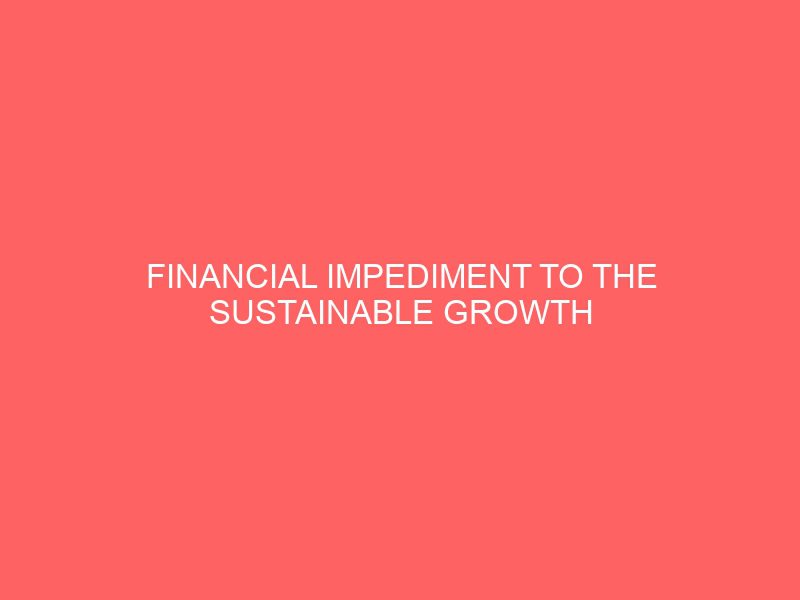Description
CHAPTER ONE INTRODUCTION Background of the Study Business exists in different forms and sizes. A business can be undertaken on a small scale, medium scale or large scale basis. Small and Medium Enterprises (SMEs) are seen as driving forces that promote and contribute immensely to the economic development of any country. Small-Scale Enterprises (SSEs) are the backbone of an economy as major contributors of job creation and play an important role as efficient providers of intermediate goods and services to large firms (Muhammed, 2010). The concept of Small-Scale Enterprises (SSEs) varies from country to country, region to region and from agencies to agencies. Different authors often use different parameters such as the number of employees, sales volume, turnover and capital to differentiate small, medium and/or big scale enterprises (Ahmed, 2006). However, these parameters do not provide uniform benchmark for all industries. Furthermore, what is a big capital today may become small in years to come (Aremu and Adeyemi, 2010). Consequently, there are as many definitions of SSEs as there are scholars and institutions. Makhbul (2011) stated that small scale industries (SSIs), small scale businesses (SSBs), and small scale enterprises (SSEs) are some of the terms that are used interchangeably to describe small and medium scale enterprises (SMEs). The author further stated that SSEs or SMEs are very heterogeneous group because these enterprises embrace a wider variety and diverse forms ranging from tailors and garments, textiles, furniture producers, wood cutting mills and bakeries. Others include villages, handicrafts centers and weavers, small machine shops, restaurants to computer software firms using sophistication and skills. The National Council on Industry (NCI, 2001) categorized SMEs into three major concepts of industrial enterprises in Nigeria: Micro/Cottage Industry, Small-Scale Industry and Medium-Scale Industry. Micro/Cottage Industry is described as an industry with a total capital of not more than N1.5 million, including working capital but excluding cost of land, and/ or a workforce of not more than 10 workers. Small-Scale Industry in the other hand is described as an industry with a total capital of over N1.5million, but not more than N50 million including working capital but excluding cost of land and/or a workforce of 11-100 workers. The term Medium-Scale Industry refers to as an industry with a total capital of over N50 million, but not more than N200 million, including cost of land, and/or, a workforce of 101-300 workers. The Central Bank of Nigeria (2008) defined small-scale enterprises as those businesses whose annual turnover was not more than N500, 000. The Federal Government of Nigeria (2008) defined small-scale enterprises for purposes of commercial bank loans as those with an annual turnover not exceeding N500, 000, and for Merchant Bank Loans, with capital investments not exceeding 2 million naira (excluding cost of land) or a maximum of N 5 million. The National Economic Reconstruction Fund, NERFUND (2003) put the ceiling for small-scale industries at N10 million. While the Central Bank of Nigeria (2004) agreed with the definition given by Small and Medium Industries and Equity Investment Scheme, SMIEIS (2004) on SSEs as any enterprise with a maximum asset base of less than N50 million (equivalent of about $0.43 million) excluding land and working capital, and with the number of staff employed not less than 10 (otherwise will be a cottage or micro-enterprise). In this study, Small-Scale Enterprises (SSEs) consist of all business organizations whose total capital is not more than N10 million including the cost of land and workforce capacity between 1 to 20. This definition is also in line with that of National Council on Industries, NCI (2001), which categorized SSEs as small and usually managed as sole proprietor with self-employment as a key element of such enterprises. SSEs are generally considered to be non-subsidiary, independent firms which employ less than a given number of employees. Small firms are mostly considered to be firms with fewer than 20 employees (Bello, 2007). The National Development Plans in Nigeria for four years since independence had laid emphasis on industrialization through the encouragement of local manufacturing industries (Ayozie, 2008). As part of the proactive strategies, the federal government of Nigeria through the Ministry of Industry, Trade and Investment has flagged off the University Entrepreneurship Development Programme (UNEDEP) to promote self-employment among youths from institutions of higher learning. Similarly, recently the federal government established the Youth Enterprise With Innovation in Nigeria (YouWiN) as a way of encouraging young entrepreneurs (UNEDEP). This was in recognition of the leading role which the local sector is expected to play in the industrialization strategy of the government as well as the overall development of the economy. Small-scale enterprises (SSEs) and Medium scale enterprise (MEs) form the core of majority of the world?s economies. A study carried out by the Federal Office of Statistics in 2003 showed that in Nigeria, SSEs (SME) make up 87% of the economy. Small Scale Enterprises in Nigeria are the most important enterprises in the economy due to the fact that when all the individual effects are aggregated, the result will surpass that of the larger companies. Small-scale enterprises (SSEs) have continued to serve the world economy as a catalyst for employment generation, national growth, poverty reduction and economic development. According to Osuala (2004), SSEs both in the formal and informal sectors employ over 60% of the labour force in Nigeria vis-?-vis Plateau State. Similarly, Plateau State is characterized by a large number of informal, small and medium businesses and formal modern firms. The industrial activities are made possible with the availability of tin, columbite, fertile soil, tourism (Ministry of Commerce and Industry, Plateau State). However, in term of output, the small scale enterprises (SSEs) and medium scale enterprises (SMEs) in 2009 accounted for 12% and 9% respectively as compared to 10% and 8% in 2007 (Plateau State Directory, 2010). This statistics shows that SSEs in Plateau State are in a transitional state. The small scale enterprises in Plateau State are based more in the production of consumer goods particularly in food production. Despite the increasing importance attached to small-scale enterprises, a lot of SSEs still find it very difficult to effectively play their role because of the high mortality rate. In Nigeria vis-?-vis Plateau State, there are a lot of problems that bedevil and stunt the growth of SSEs. According to Organization for Economic Co-operation and Development (OECD, 2012) SSEs in Nigeria vis-?-vis Plateau state are suffering from the consequences of policy inconsistency, insecurity, poor access to finance, poor infrastructure, insufficient know-how and low level of technology, and so many others. Therefore, finance is a major tool that can affect the growth and development of any business organization. For the purpose of this study financial impediment simply refers to every delay, hindrance, action, obstacle or retardation; any structure that makes progress difficult to SSEs. Every business organization, small, medium, and large operates within the framework of financial fundamental concept, and the basic financial management principle is financial decision: the principle (finance) is the determinant of when, where and how to acquire funds to finance the business (Fabayo, 2009). According to Osuala (2004), the dearth of adequate source of finance has been a major impediment that inhibits the growth of SSEs in Nigeria vis-?-vis Plateau State. Similarly, according to Alade (2004) collateral based financing has become increasingly difficult for SSEs, whether as existing businesses, in their expansion states or as start-ups. The author noted that the key components of financial impediment are weak government policies, poor management practices and low credit facilities. One of the financial impediments that may have been confronting SSEs in Nigeria vis-?-vis Plateau State is not knowing how to raise funds or capital for their business. The various ways of raising funds opportunities are not widely known to these SSEs. According to The Nigeria Investment Promotion Commission, (NIPC, 2010) SSEs lack knowledge of finance supply, sources and available banking and credit services. NIPC noted that this stifles the take-off and growth of SSEs in Nigeria. Another area of emphasis is in management. In addition, according to Plateau State Ministry of Commerce and Industries in 2005, banks in the state are reluctant to lend SSEs due to their inability to meet the bank?s lending requirements such as lack of management and entrepreneurial skills, poor and unreliable financial records among others (Abor, 2008). Similarly, the small-scale enterprises (SSEs) financial management practice of some of the SSEs is characterized by the highly personalized preferences and prejudices. The attitude of some entrepreneurs to loans and that of their workers to work is counterproductive. Many entrepreneurs (managements) when offered with credit facilities believe that it is their share of the ?national cake? (Ireghah, 2011). The author also noted that most small-scale enterprises managers and accountants do not believe that qualification and managerial ability are important for business growth and survival, and so have neglected these factors as basic for the development and growth of their businesses. Furthermore, government is meant to act as a business regulator with the overall aim of helping to maintain a climate of confidence and stimulate the activities of the enterprises, so that they can have the respect for the rule of competition (Wahab and Ijaiya, 2010). But on the contrary, government policies seem to have constituted a serious problem to the growth of SSEs. Weak government financial regulatory policies take different forms: regulations governing the starting of business, access to funds, interest rates, taxation and foreign trade (Kasseeah, 2012). In many African countries vis-?-vis Nigeria, business laws are archaic, too complex and too general in relation to SMEs, most of whom tend to be ill informed about these laws. Government regulations on businesses distort the operation of the free market enterprises system and impede competition; many of the regulations require the same level of compliance for both small and large enterprises. From all the problems mentioned it is obvious that the government have not been able to realign their policy frameworks to combat the deepening crises of development that has plagued SSEs. Therefore, since business ideas cannot survive without proper financing, there is the need to intensify efforts to promote business support services for SSEs with a view to upgrading them to sound and sustainable business entities. Statement of the Problem Small scale enterprises (SSEs) and medium enterprises (MEs) form the core of majority of the world?s economies. SMEs contribute to improved living standards, bring about substantial local capital formation and achieve high level of productivity and capability. The sector has also been identified as vehicles for employment generation and providing opportunities for entrepreneurial sourcing, training, development and empowerment. The Federal Office of Statistics of Nigeria stated that small-scale enterprises make up 87% of the economy. As part of the proactive strategies, the federal government of Nigeria through the Ministry of Industry, Trade and Investment has flagged off the University Entrepreneurship Development Programme (UNEDEP) to promote self-employment among youths from institutions of higher learning. Similarly, the federal government established the Youth Enterprise With Innovation in Nigeria (YouWiN) as a way of encouraging young entrepreneurs, to stem youth restiveness and their involvement in social vices as well as to engage them in productive economic activities. Furthermore, the Central Bank of Nigeria (CBN) recently launched a N220 billion Micro Small and Medium Enterprises (MSME) Development fund. The aim was to provide funds at a cheap cost and longer terms compared to what is obtain at commercial banks. Despite the increasing importance attached to small-scale enterprises, a lot of SSEs still find it very difficult to effectively play their role because of the high mortality rate of these small firms especially in Plateau State. According to the Small and Medium Enterprises Development Agency of Nigeria (SMEDAN, 2013), 80% of small businesses die before their 5th anniversary. Some of these constraints have been identified to include high interest rate, banks? apathy to financing SMEs because of the perceived risks in the system, multiple taxation, poor accounting system, weak management system, marketing, economic, planning and finance. It is often conceived that faster economic growth will not be possible without finance. Realizing that finance is the propeller that key the engine for the running of any business organization, this study is undertaken to identify the financial impediments (weak government financial regulatory policies, low credit facilities, mismanagement and poor financial practices) to the sustainab







